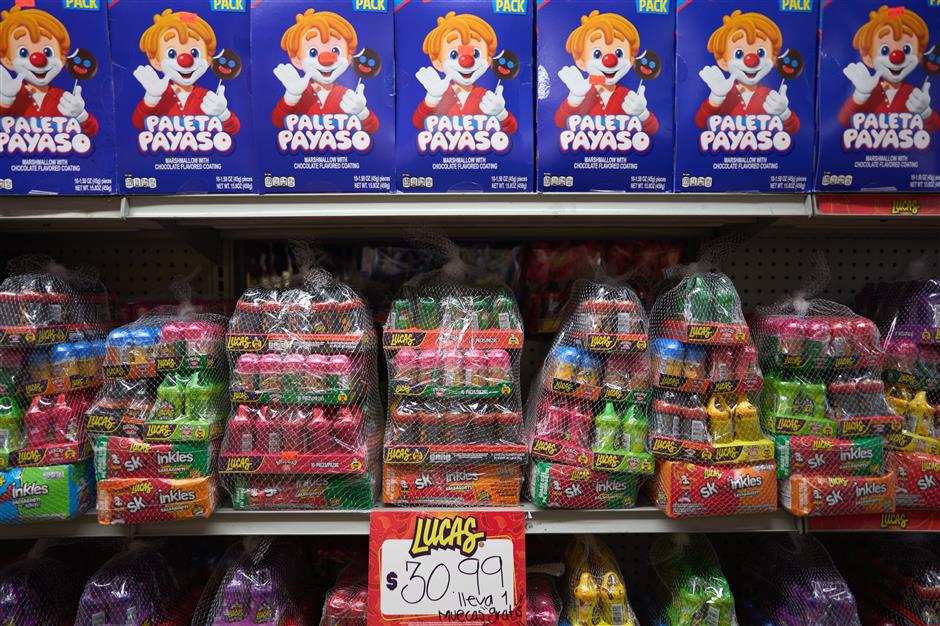Will Trump's punitive tariffs make him 'the grinch that stole Christmas?'
Is US President Donald Trump going to become "the grinch that stole Christmas?"
There are rumblings to that effect in the US after punitive tariffs on China hit what is commonly dubbed the world's "Santa workshop."
Tariffs of 145 percent have curtailed, or even stopped, orders from US retailers for toys and Christmas decorations made in China at a time when wholesale preparations for the late-year holiday are normally underway.
One US toy brand owner from Texas, who requested anonymity, said the new tariffs could deliver a "big negative impact" on his business. His company designs and owns products manufactured in Asia – mostly in China – and sold primarily through Amazon and Walmart.
"We've prepared by shifting some production to Vietnam and Indonesia, but it's not enough," he said. "These tariffs hurt all of us."

Christmas ornaments are displayed in Yiwu markets.
Indeed, US consumers will be faced with paying more to buy toys and decorations made overseas or forfeiting purchases altogether.
The Texas toy company spokesman said it's impossible for US companies to fill the gap.
"The suppliers don't exist. American manufacturing is a fantasy," he lamented.
Traditional US holiday cheer leans heavily on sourcing goods from China. International Trade Center data for 2023 data showed China supplied 90 percent of holiday-related products imported by the US. According to The Toy Association, nearly 80 percent of the toys sold in the US are sourced from China.
"There are reports that major retailers here in the US are starting to actually cancel orders," the association president, Greg Ahearn, told CNN. "Christmas is at risk."

Toys imported from China are displayed in Los Angeles.
From Christmas trees and plastic ornaments to LED string lights and holiday toys, festive staples are made thousands of miles from the US, by workers in factories in the places like Yiwu and Jinhua in Zhejiang Province, and in Guangdong Province.
This new tariff timing couldn't be worse. Most American retailers place Christmas orders between March and May, and shipments are completed in early autumn. The impact of the tariff war on Chinese vendors depends on the size of their exposure to the US market.
"By late April, our orders are usually finalized," an artificial Christmas-tree maker in Jinhua posted on the social media platform Xiaohongshu, or RedNote, under the online name Wendy. "But so far, none of my usual American clients has confirmed anything,"
As of April 4, she said her warehouse was already filling up with stacks of boxed artificial trees ready for shipment and waiting for orders that haven't come.
"There is real pressure this year," she posted. "Our products usually sell well in the US. But now clients are hesitating, and we can't do anything but wait."

One of the workshops of Guo's Christmas tree factory in Jinhua, Zhejiang Province
Another factory owner, identified only by the surname Guo, said she is remaining cautiously optimistic. While she acknowledged that US orders may decline, she said she believes her company can weather the storm by finding other markets. Europe, Southeast Asia and South America already account for a significant share, around 85 percent, of her business.
"Orders from other countries are doing well. They've grown nicely," she said. "Even if US orders take a hit in the short term, we're still confident."
In the city of Yiwu, Janey Zhang, who sells light, luxury umbrellas to buyers around the world, also exuded calm. Her company ships over 5 million umbrellas a year to more than 200 countries, and sales to the US register "barely a blip," she said.
"There are plenty of customers from Europe and Belt and Road countries," she said. "One of my clients told me they even saw my umbrellas in the royal palace in Spain."

Zhang's light, luxury umbrellas are sold worldwide.
Yiwu is one of the world's largest wholesale hubs for production of small commodities, home to over 75,000 individual businesses that produce, among other things, holiday items.
According to customs data, Yiwu's exports in 2024 rose 18 percent from a year earlier to 589 billion yuan (US$81 billion).
While the US remains the single largest overseas market for Yiwu exports, the city's trading network extends across Asia, Africa and Latin America.
"Yiwu does business with the whole world," Zhang said.
According to China's National Bureau of Statistics, a more diversified export structure is gradually taking shape. In 2018, the United States accounted for 19.2 percent of China's total exports. By 2024, that share had fallen to 14.7 percent.
For many Yiwu vendors, a diversified customer base is what gives them confidence amid the shifting dynamics of US-China trade relations. Only about 3,000 of its 75,000 retailers in Yiwu Commodity Market are involved in trade with the United States, and fewer than 100 are engaged in direct exports to the US, according to Chinese media reports.
But while many Chinese exporters warm to diversified markets, American families may feel the chill in the runup to Christmas in December. All the mainstays of their holiday season are likely to become pricier or harder to find.
Take artificial Christmas trees for example. A quality 7.5-foot artificial tree from China that used to cost US$200 could jump to US$490 under the full 145 percent tariff regime.
Fearing that they won't be able to afford stocking stuffers or toys their children ask Santa to bring, some parents are doing their Christmas shopping early – very early.
Social media reaction has ranged from anxious to ironic. "Better buy the toys now," one user warned on TikTok. "How about no gifts this year?" another suggested.













